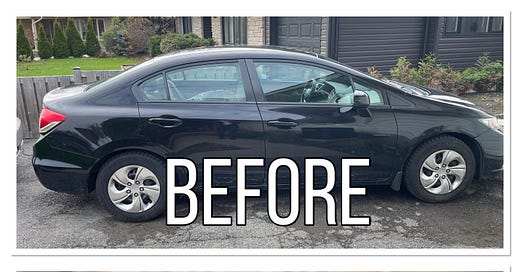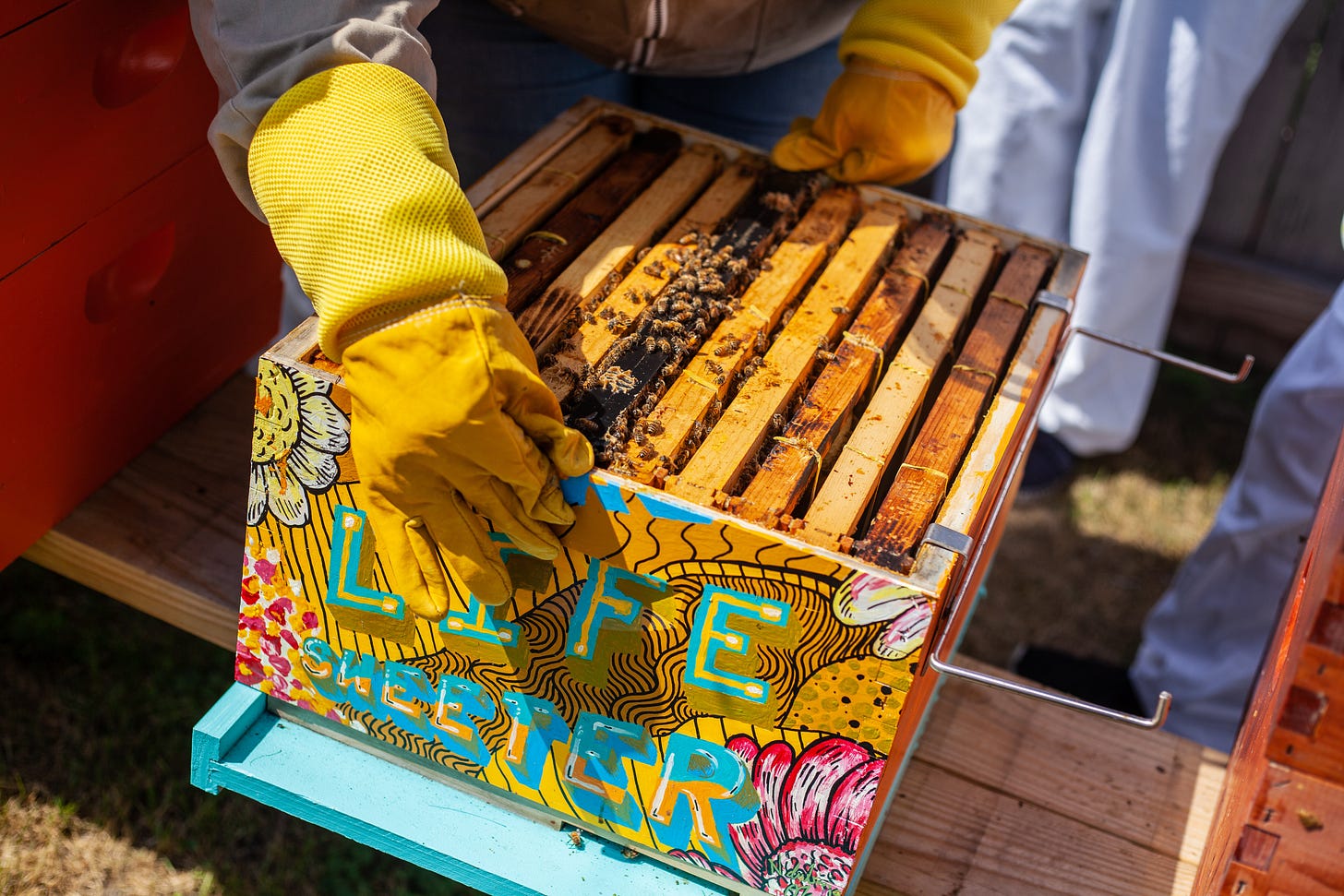Friday Notes - April 28, 2023
Reflecting on selling my car; a poem by Loren McGrail; Friday Five - 5 podcasts to listen to
I Sold My Car
Yesterday morning, I sold my car, one of two that our family of five had, to a family friend (doesn’t it feel better when something you had goes to “a good home”?!). We decided to sell it for a few reasons. The first is that I work primarily from home now, so have little need for it. When I was working in rural ministry, it was most definitely needed, and I am grateful that we were able to afford a reliable used vehicle for my long drives to and from a two-point charge in the Pontiac, in the west end of Quebec.
The second reason is that, by selling it, we are able to put more cash back into our bank account, and reduce our monthly expenses significantly. We estimate that we’ll now be saving at least $300 a month over the course of a year, at the current rates for gas, maintenance, and insurance.
Finally, the most important reason that we have sold the car is to reduce our carbon footprint. We have a fairly decent transit system in the city of Ottawa (LRT problems notwithstanding), and so I have replaced the car with a transit pass. I have a lovely new-to-me bicycle that I was gifted for free on my local Buy Nothing Facebook group. Where I can’t go by transit or bike, we still have the van, and there is a carsharing company nearby. There are taxies and Uber, and there is a car rental place nearby if need be. In other words, I have plenty of alternatives to owning a second car, particularly a second one that runs on gasoline.
If you recall, a number of months ago I told you that I was going to try to leave my car in the driveway more, and use my bike and the bus to get around. I was trying to be more accountable, taking seriously my carbon footprint, and begin to live my life as if I didn’t have the second car. I was hoping to be more intentional in how I travelled around the city, and use it as a way to prayerfully respond to God’s call to reduce my carbon footprint in my individual actions, as well as working for social and political change.
Well, my friends, guess what? I failed at this effort. Miserably. I discovered, to my chagrin, that as long as I had my car in the driveway, I used it. I don’t know if it would have been this way in a bigger city with a subway a few blocks away (I never missed a car in Toronto during the ten years I lived there), but this is how it was for me here. When the convenience of a car was right there, a convenience that I realize I am incredibly privileged to enjoy, I took advantage of it.
I am not proud of this reality, but it has made me realize the ties that bind us to our usual ways of doing things, the normal ways that we live our lives. Most of us, particularly in the global North, are quite accustomed to having our creature comforts. We don’t want to give up those creature comforts, even when they are bad for the Earth, bad for the climate. Here I am, 20 years and counting in studying and working for faith-based climate action, and I am not all that different from someone for whom the issue of climate change is less central to their interests and vocation.
How do we give up our creature comforts willingly, before we are forced to by climate-based circumstances? Do we have to get rid of our cars in order to start using transit (where reliable transit is available)? Are we willing to sell the second car, if we have two, or get rid of the only one, if our usual activities are a bus trip or walk away? Do we have to get rid of our clothes dryers in order to put our clothes on the line? Do we have to find a store that does not sell meat, so that we stop buying it so much, and eat more plant-based? What will it take for us to make the changes that we know we must? The changes that, ideally, we would like to be making?
I know that there are many situations in which it is infeasible, if not impossible, to give up a car. However, part of this experiment, for me, was to ask myself: do I really need that second car? Or is it a really nice want? Each person must ask that question for themselves in the context and situation that they are in at present.
That being said, the questions I raise above, about what it will take for us to change our ways voluntarily, also hold for taking social and political action. What are the circumstances in which we will move out of our comfort zones and usual schedules to take time and energy to agitate for change?
If you see me on the bus or riding by on my bike, say hi! While I am there, I will be reflecting on these questions. I hope you will, too.
Poem
A subscriber reached out to me last week and shared the following poem with me. Loren McGrail is a pastor, poet and artist. She gave me her permission to share this poem with all of you. It is haunting:
Dawn at the Hive
But bees do not bleed
she extorts exclaiming another false
apocalypse alarm
she doesn’t have to
pay attention to
They die from neurotoxins
while napping pollen coated
in flowers or
trying to waggle dance
to show where the food is
or find their way
home
they die lost and alone
then
the colony collapses
into ‘disorder’
chaos then
empty no blood
no little dead bodies
The bees are
collateral damage
for higher crop yields until
there are no more fruits or trees
because
there are no more bees
then
outside the garden gate
we die too and
there are bodies and blood everywhere
Our sin, Dear Ones, is not
eating the apple but
killing the tree
before it could become itself
a place where we could
root our muddy selves
and then feast on
wild honeycombs
Loren McGrail
Call to Action
For those who are new here, I used to call this section “Discipleship in Action.” But I realized that is a bit of an oxymoron; discipleship is action. It is the action of how we live our faith out in the world, how we are called by God to follow in the way set forth by Jesus.

Today’s Call to Action: Declutter Your Closet
Declutter my closet? How is that discipleship? We are called in this time of climate crisis to get at the heart of the problem: the rampant consumerism that is using up and spitting out so much of the Earth’s precious riches, at the expense of the land, air, water, soil, and atmosphere. I have shared material with you before regarding the complexity and perils of fast fashion (Aja Barber’s book, Consumed is a critical text to explore this issue. You can also follow her here). I have been following a local clothing designer, Rebecca Rowe, who encourages the work of decluttering and choosing few pieces of clothing that suit who you are and how you want to present in the world. Her work is not explicitly in response to the climate crisis or the evils of fast fashion, but it is completely in line with these related concerns. You can find her website here and follow her here.
This call to action is to declutter your closet: remove the things you don’t wear, that don’t fit, that you don’t need, and donate the ones that are in good shape to a charity (church thrift stores are awesome, and don’t hike up the prices like some places we know…). You can also gift them in a local freecycle group. In doing so, I invite you to engage in this process in a discerning, prayerful way: use it as a time to pray to God and offer this action up as a small way of offering something to others, and to commit to change your own habits, to get out of the trap of fast fashion, and work to limit your consumption levels as part of our own individual behaviour change. This practice can be one of discipleship in action!
Friday Five
Five Podcasts to Listen To
I looked these up on Apple Podcasts, but you can find them anywhere you like to listen.
1. Earthkeepers: A Circlewood Podcast on Creation Care and Spirituality
2. As She Rises: The Story of Climate Change https://www.wondermedianetwork.com/originals/as-she-rises
3. Green Dreamer: Seeding change towards collective healing, sustainability, regeneration
4. Sustainability, Climate Change, Politics, Circular Economy & Environmental Solutions · One Planet Podcast
5. An Idiot’s Guide to Saving the World
Coming Up
This Sunday, I will be preaching at Trinity-St. Andrew’s United Church in Renfrew, ON. Drawing on Psalm 23 and John 10:1-10, in which Jesus promises us abundant life, I am going to reflect on what that abundant life means in light of the climate emergency. If you can join us in person or online, that would be wonderful! Here are the details:
Trinity-St. Andrew’s United Church
291 Plaunt St. South
Renfrew ON
April 30, 2023 10 am in person or on YouTube here.
That’s all for this week! May you be blessed with a weekend in which you feel the sun on your skin and the wind in your hair, and can smell the new life all around you.








Congratulations on walking the talk!